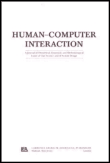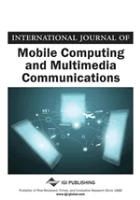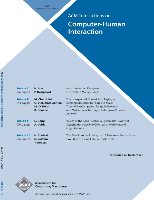
International Journal of Mobile Human Computer Interaction
Scope & Guideline
Bridging theory and practice in mobile HCI.
Introduction
Aims and Scopes
- User Experience Research:
The journal emphasizes research that investigates user interactions with mobile devices, including usability studies, user satisfaction, and the overall quality of user experiences. - Mobile Technology Applications:
It covers various applications of mobile technology, particularly in areas such as mental health, education, and food delivery, exploring how these technologies impact users and society. - Trust and Perception in Mobile Interfaces:
Research on user trust, likeability, and perceptions of mobile interfaces, including virtual agents and intelligent agents, is a consistent focus, highlighting factors that influence user engagement and satisfaction. - Demographic Studies in Mobile Usage:
The journal includes studies that analyze demographic factors affecting mobile technology use, such as age differences in smartphone task performance, which contribute to understanding diverse user needs. - Innovative Interaction Techniques:
Research on novel interaction techniques and design considerations for mobile interfaces, including visual aesthetics and deep learning applications, is also a key area of interest.
Trending and Emerging
- Integration of Artificial Intelligence and Machine Learning:
There is a growing trend towards exploring AI and machine learning applications in mobile interfaces, such as intelligent agents that enhance user interaction and personalize experiences. - Mental Health and Wellbeing Applications:
Research focused on mobile mental health applications is on the rise, reflecting an increasing recognition of the role of mobile technology in supporting mental health and wellbeing. - User Trust and Perception Studies:
There is an emerging emphasis on understanding user trust and perceptions related to mobile technology, particularly in the context of virtual agents and automated systems, which is crucial for user adoption. - Accessibility and Inclusivity in Mobile Design:
An increasing number of studies are addressing accessibility issues and the design of mobile applications for diverse user groups, such as visually impaired individuals, highlighting the importance of inclusive design. - Critical Incident Technique in User Experience Research:
The application of the Critical Incident Technique to explore user experiences in mobile contexts is gaining traction, allowing for deeper insights into user interactions and challenges.
Declining or Waning
- Traditional Usability Studies:
While usability remains important, traditional usability studies without innovative methodologies or technology integration seem to be less frequent, possibly due to the increasing complexity of mobile applications. - General Demographic Analysis:
Broad demographic analyses without specific insights or actionable outcomes for mobile technology usage are appearing less often, indicating a move towards more targeted studies that provide deeper insights. - Static Comparisons of Mobile Interfaces:
Comparative studies of mobile interfaces that do not incorporate evolving technologies or user-centric approaches are waning, as the field shifts towards more dynamic and user-focused research.
Similar Journals

Journal on Multimodal User Interfaces
Enhancing Interaction: Where Technology Meets UsabilityJournal on Multimodal User Interfaces, published by Springer, serves as a vital platform for scholarly exchange in the rapidly evolving fields of Human-Computer Interaction and Signal Processing. Established in 2008 and continuing through 2024, this journal maintains a high profile in academia, currently ranking in the Q2 category for both fields, indicating its significant contribution to ongoing research and practical applications. With its Scopus rankings placing it at #34 in Signal Processing and #49 in Human-Computer Interaction, it is recognized for publishing high-quality, impactful research. Although it is not an Open Access journal, the Journal on Multimodal User Interfaces remains accessible through institutional subscriptions. Researchers, professionals, and students will find the journal an essential resource for advancing knowledge and fostering collaboration in multimodal interaction technologies, which are crucial for enhancing user experience and developing intelligent systems.

Journal of Usability Studies
Enhancing interactions through rigorous research and analysis.The Journal of Usability Studies, published by the USERS EXPERIENCE PROFESSIONAL ASSOCIATION, is a pivotal platform for researchers and professionals dedicated to advancing the field of usability and user experience design. With an ISSN of 1931-3357, this journal offers a collection of peer-reviewed articles that explore innovative methodologies, emerging technologies, and applied research in usability studies. Though it operates under a traditional access model, the journal remains dedicated to fostering a detailed understanding of how users interact with systems and products. The Journal of Usability Studies is instrumental for those aiming to enhance user satisfaction through research-backed insights, making it a vital resource for academics, practitioners, and students seeking to contribute to the evolving discourse in human-computer interaction and usability engineering.

USER MODELING AND USER-ADAPTED INTERACTION
Transforming Education Through User-Adaptive InsightsUSER MODELING AND USER-ADAPTED INTERACTION, published by SPRINGER, stands as a pivotal journal within the realms of Computer Science Applications, Education, and Human-Computer Interaction. With an ISSN of 0924-1868 and an E-ISSN of 1573-1391, this journal has established a reputable presence since its inception in 1991, continuing to contribute to the scholarly discourse through 2024. With an impressive impact factor reflective of its high visibility, it is ranked in the top quartiles, notably Q1 in both Computer Science Applications and Education, and Q2 in Human-Computer Interaction as of 2023. This positions the journal within the 95th percentile in Social Sciences Education and the 81st percentile in Human-Computer Interaction. As it encompasses a broad scope that integrates user modeling techniques with adaptive interaction strategies, the journal caters to the needs of researchers, professionals, and students keen on advancing knowledge in adaptive technology, educational tools, and user-centric design. While not currently open access, it remains a valuable resource for anyone interested in the intersection of user experience and technological adaptation.

HUMAN-COMPUTER INTERACTION
Transforming User Experience Through ResearchHUMAN-COMPUTER INTERACTION is a premier academic journal published by Taylor & Francis Inc, dedicated to the interdisciplinary field of HCI, which explores the dynamic interactions between humans and computers. With its ISSN 0737-0024 and E-ISSN 1532-7051, the journal maintains a strong presence within the academic community and is recognized for its significant impact, holding a commendable impact factor that underscores its relevance. Ranked in the Q1 category for both Applied Psychology and Human-Computer Interaction, it occupies a critical position in Scopus rankings, listed as #15 in Applied Psychology and #11 in Computer Science, Human-Computer Interaction, placing it in the top 6% of relevant fields. Covering a broad spectrum of topics from usability studies to user experience design, the journal aims to facilitate innovative research and provide insights that bridge theoretical frameworks and practical applications. Published since 1985 and continuously evolving, HUMAN-COMPUTER INTERACTION remains an essential resource for researchers, professionals, and students eager to contribute to and benefit from advances in understanding how technology can effectively serve human needs.

mHealth
Pioneering Research in Mobile Health TechnologiesmHealth is a pivotal peer-reviewed journal published by AME PUBLISHING COMPANY, focusing on the evolving field of mobile health technologies and their impact on public health and health informatics. With an E-ISSN of 2306-9740, this journal, based in China, operates under an open access model, ensuring widespread dissemination and accessibility of published research. As of 2023, mHealth is recognized in the Q2 category for both Health Informatics and Public Health, Environmental and Occupational Health, reflecting its significant contribution to vital areas of contemporary health research. The journal's Scopus rankings further enhance its reputation, situating it in the 74th percentile for Public Health and 64th for Health Informatics, making it an essential resource for researchers, professionals, and students eager to explore the intersection of technology and health outcomes. Covering a diverse range of topics from 2019 through 2024, mHealth aims to foster innovation and knowledge exchange among practitioners and scholars alike.

IADIS-International Journal on Computer Science and Information Systems
Advancing Knowledge in Technology and InnovationIADIS-International Journal on Computer Science and Information Systems is a prominent platform dedicated to advancing research and knowledge in the field of computer science and information systems. Published by IADIS, this journal aims to disseminate innovative findings and theoretical advancements that address contemporary challenges and trends in technology. The journal fosters a rigorous peer-review process, ensuring that only high-quality research is shared with its audience, which includes researchers, professionals, and students from around the globe. Although the journal is not currently open access, it serves as a vital resource for those looking to deepen their understanding of the evolving landscape of computer science. The ISSN of this journal is 1646-3692, and it boasts a strong commitment to promoting interdisciplinary communication and collaboration in the realm of information technology, making it an essential read for anyone looking to stay at the forefront of this fast-paced field.

International Journal of Mobile Computing and Multimedia Communications
Connecting Ideas, Transforming TechnologiesThe International Journal of Mobile Computing and Multimedia Communications, published by IGI Global, stands at the intersection of technology and connectivity, addressing the critical advancements in mobile computing and multimedia communications. With an ISSN of 1937-9412, this journal provides a platform for the dissemination of innovative research findings and insights, fostering collaboration and communication among researchers, professionals, and students within the field. Although currently indexed in the Q4 quartile for 2023 in Computer Networks and Communications, its rich archive of articles from 2009 to 2014 and 2016 to 2024 reflects the journal's ongoing commitment to exploring emerging trends, technologies, and methodologies that shape the future of mobile computing. While it is not an open-access journal, the high-quality research published here is crucial for advancing academic discourse and practical applications in an increasingly digital world. By encouraging submissions across a wide range of topics, International Journal of Mobile Computing and Multimedia Communications continues to enhance its reputation as a pivotal resource for scholars and industry experts alike.

ACM Transactions on Computer-Human Interaction
Empowering Research that Shapes Tomorrow's InterfacesACM Transactions on Computer-Human Interaction (ISSN: 1073-0516; E-ISSN: 1557-7325) is a prestigious journal published by the Association for Computing Machinery, focusing on the dynamic and rapidly evolving field of Human-Computer Interaction (HCI). With an impressive 2023 impact factor reflecting its high-quality research output, it proudly holds a Q1 ranking in the HCI category on Scopus, positioning it among the top journals in the field. Established in 1994, the journal has been a vital resource for researchers and professionals alike, featuring innovative studies that explore the design, evaluation, and implementation of user interfaces and interactive systems. Its broad scope encompasses various aspects of HCI, including cognitive processes, user experience design, and the social implications of technology. As an essential read for anyone involved in HCI research and practice, the journal is a gateway to advancements that shape the future of human-technology interactions. The journal is accessible to readers globally, and it plays a pivotal role in disseminating knowledge that drives excellence in software design and user interface research.

CCF Transactions on Pervasive Computing and Interaction
Exploring Innovations in Pervasive TechnologiesCCF Transactions on Pervasive Computing and Interaction, published by SPRINGERNATURE, is a leading academic journal dedicated to advancing the field of pervasive computing and interaction. With an ISSN of 2524-521X and E-ISSN 2524-5228, this journal is well-regarded for its rigorous peer-reviewed research, featuring influential studies that explore the intersection of Artificial Intelligence, Computer Networks and Communications, Computer Science Applications, and Human-Computer Interaction. Recognized in the 2023 journal rankings, it holds a prestigious Q2 quartile classification across these domains, reflecting its impact and relevance in the academic community. Researchers and practitioners can greatly benefit from its contributions, showcasing innovative approaches and technologies that shape the future of interactive computing. Although currently not following an open-access model, the journal underscores its commitment to high-quality research dissemination, making it a vital resource for those interested in the evolving landscape of pervasive technologies and user-centric designs. For more information on submissions and access options, please refer to the official website.

COMPUTING AND INFORMATICS
Bridging Theory and Practice in InformaticsCOMPUTING AND INFORMATICS is a peer-reviewed academic journal published by the Slovak Academy of Sciences Institute of Informatics, focusing on various aspects of computer science and its applications. Established in 2000, this journal has garnered attention for its emphasis on computational theory, computer networks, software development, and hardware architecture, placing it in the competitive landscape of academic publishing with currently a Q3 ranking in the fields of Computational Theory and Mathematics, and Computer Networks and Communications, as well as Q4 ranking in Software and Hardware and Architecture categories. Readers can access its findings through Open Access, promoting wider dissemination of innovative research. With an ISSN of 1335-9150 and an E-ISSN of 1335-9150, the journal serves as a vital platform for showcasing cutting-edge research in the field, aiming to bridge theoretical foundations with practical applications. This journal not only contributes to the academic community but also supports the ongoing advancements in technology and informatics, making it an important resource for researchers, professionals, and students keen on staying at the forefront of the field.